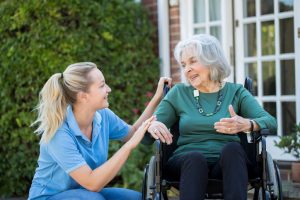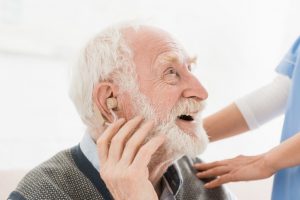At Green Tree Home Care, we are happy to answer any questions you have about choosing the right home care agency for mom or dad. Call us today if you live the San Diego and Orange county areas.
You live far away from mom or dad and you need to find the right home care agency.
You want to pick an agency that will help them continue to enjoy the comforts of home while getting the care they need.
We know that finding and picking the right home care agency for your loved one is hard; but it is not impossible.
In today’s post, we’ll share some tips on how you can find and pick the right home care agency for your loved one.
Choosing the right home care agency for mom or dad
Do your research
These days, rating websites like Yelp or Google Reviews or A Place For Mom make researching a business easy.
Note however that people usually don’t rate a business unless they have had a bad experience. So while we recommend starting here, it’s also important to take the worst reviews with a grain of salt.
Most of these websites are based on a 5-star system with 5 stars being the best.
Our recommendation is that you can read the 3-star and 4-star reviews and find out what the complaints of these individuals were.
This should give you some insight into what the particular home agency does well and what may be lacking.
Check out their website
Once you’ve found out what other people have to say, go and find out what the home care agency has to say about itself.
You will find a lot here too.
If you cannot find all (or almost all) the information you need about a home care agency on their website, this could be a red flag.
A business that is marketing itself online needs to make answers to potential clients’ questions easy.
They can do this easily via their website and if they are not, we recommend that you pass.
If the home care agency has social media channels, these would be good to check as well.
Talk with the home care agency
By this point, you would have made a short-list of home care agencies to pick from for your aging loved one.
Our next recommendation is that you call the home care agency and speak with someone.
Questions you can ask while on the call with them include:
- How do you vet your employees?
- Does your company have a license? Is there a website or place I can call to verify this information?
- What kind of training do you give your caregivers?
- Do you have caregivers who know how to deal with people with disabilities?
- When can you start providing services?
- Will my elderly loved one have the same caregiver(s) each time? If you have to change caregivers, how much notice will I get?
- Do you an external monitoring of your caregivers to ensure my loved one is not being abused?
- How do your caregivers handle emergencies?
- What happens if a scheduled caregiver doesn’t show up?
- If I have concerns about my loved one’s care, who should I report this to?
Any good home care agency will happily answer each of your questions and make sure to allay any fears you have.
Choosing the right home care agency for mom or dad, doesn’t need to be hectic when you follow these steps.




